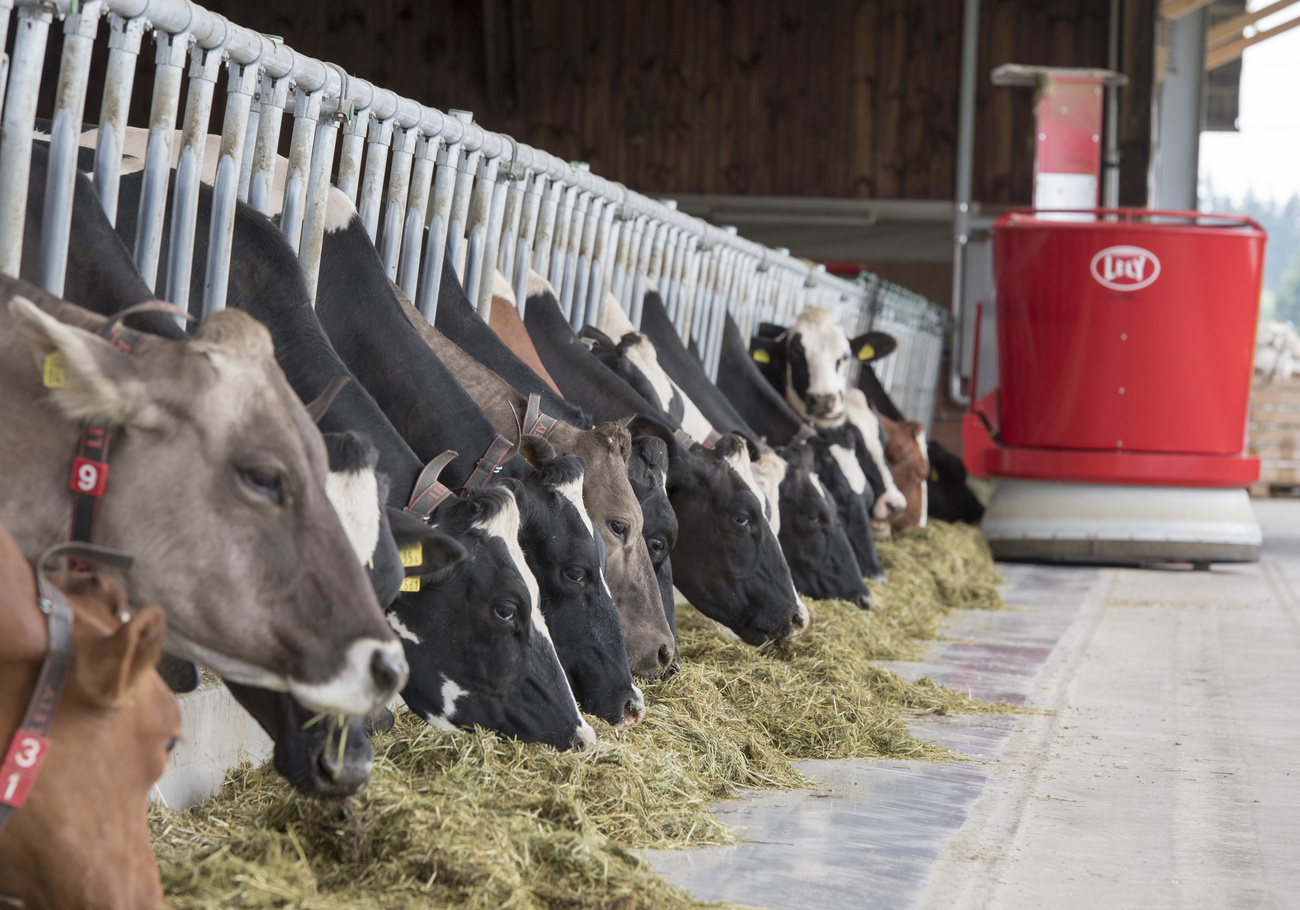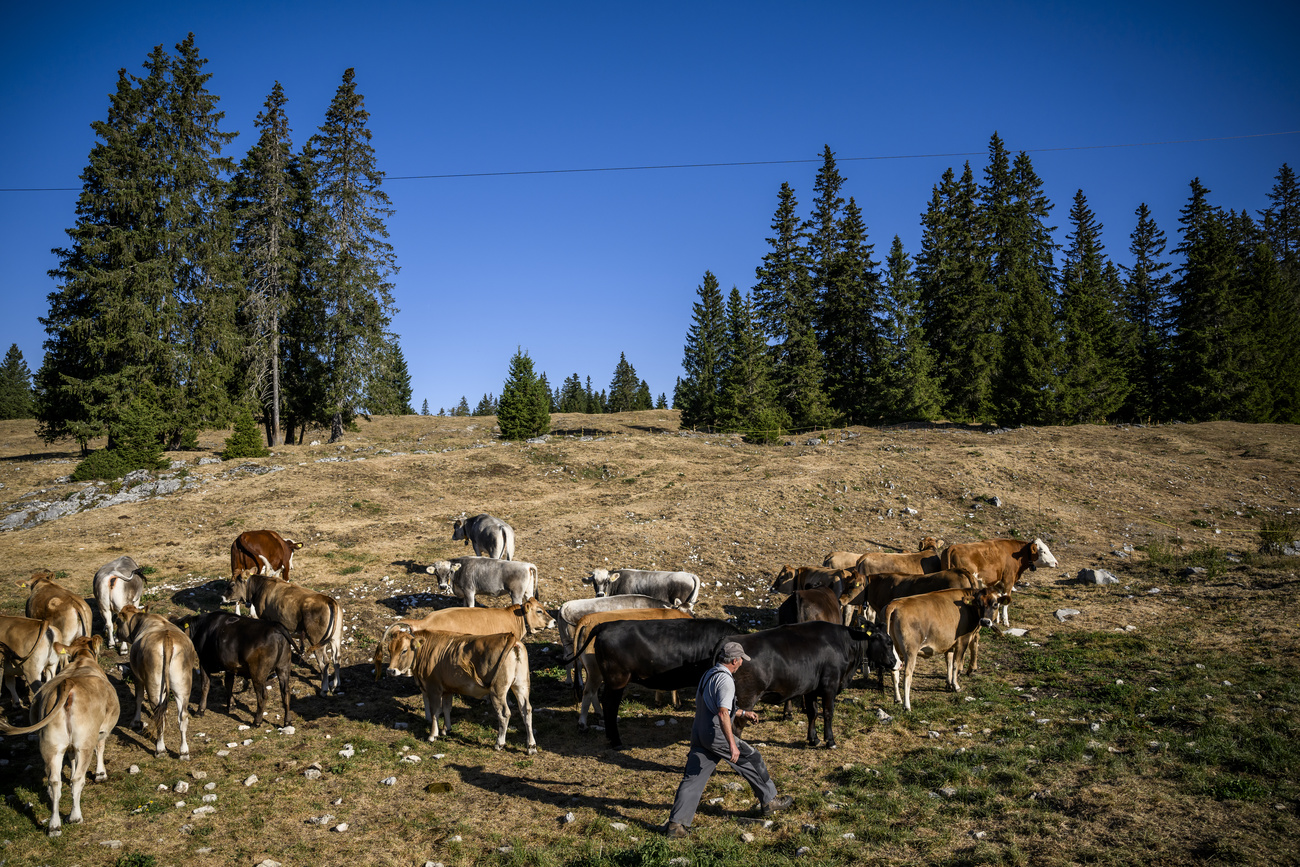
Voters reject ethical overhaul of animal farming rules

Swiss citizens have comprehensively turned down an initiative to ban intensive livestock farming and to boost animal welfare rules. Farmers are celebrating what they see as a vote of confidence in Swiss agriculture.
Another rural victory: after some heated votes involving agriculture in recent years, including on pesticides last summer, citizens have again sided with the majority of Swiss farmers – this time in a vote touching on industrial farming and meat consumption.
Final results on Sunday showed some 63% of voters said no to the “factory farming” initiative – considerably more than surveys had predicted in recent weeks. Canton Basel City was the only of the 26 regions to approve the idea.
Interior Minister Alain Berset, responsible for the government’s stance on the initiative, said on Sunday that citizens had “judged that the dignity of animals is respected in our country, and that their well-being is sufficiently protected by current legislation”.
Analyst Lukas Golder from the Gfs Bern research institute agreed: such a clear rejection was a sign that voters weren’t convinced by the relevance of the proposal, or by the claim that there was a problem in need of fixing, Golder told SRF.
The initiative – triggered by campaigners who had collected 100,000 signatures – had demanded various improvements for farm animals, including guaranteed regular outdoor access and a reduction in the maximum numbers allowed in a single stable.
More
Opponents of the ban, including government and a majority of parliament, had warned that the change would have led to higher prices, reduced consumer choice, and floods of foreign products arriving to fill the gap – despite the initiative stipulating that imports would also have to conform to the new standards.
Over the past months, a majority of farmers, led by the Farmers’ Federation, fought vehemently against what they saw as an unfair attack on them as a means to reduce meat consumption in society more broadly.
For Martin Rufer, director of the Swiss Farmer’s Federation, the rejection of the initiative amounts to a vote of public confidence in the country’s agricultural system. Accepting it would have meant serious consequences for farmers and Swiss food production, he told public television SRF on Sunday.
Awareness raising
Supporters had mixed reactions to the defeat on Sunday. While some talked up the fact that they had “raised awareness” about animal welfare, others were more circumspect. Campaign director Philip Ryf said it was a “missed opportunity” to convince the public of the long-term benefits of reducing livestock numbers. Referring to the hefty financial means of the opposition camp, he said it had been a “David versus Goliath” campaign.
As for their arguments, while the backers had centred their message around ethics and animal welfare, environmental concerns were never far away. After a drought-hit summer, campaigners saw the reform as a way to adapt Swiss agriculture to the global fight against climate change – which calls for reduced meat consumption and the repurposing of land to produce more vegetables and less animal feed.
They also didn’t deny that prices of animal-based products would rise as a result of the new rules. But this was a necessary evil to combat the health and environmental impact of intensive farming, they said. Meat should be a quality product for which consumers will pay more but eat less of. “Let’s go back to Sunday roasts!” said Green Party politician Meret Schneider during the campaign.
Should the factory farming initiative have been accepted, farmers would have had up to 25 years to adapt to the rules. And although the result on Sunday gives them some breathing space, they yet remain under pressure.

More
Swiss agriculture remains under pressure despite success at ballot box
Ban on factory farming: 37% yes, 63% no
Pension reform/retirement age women: 50.6% yes, 49.4% no
Pension reform/increase in VAT: 55.1% yes, 44.9% no
Reform withholding tax: 48% yes, 52% no
Turnout: 52.3%
About 5.5 million citizens, including registered Swiss expats, were eligible to take part in the ballots.
Votes on a wide range of different issues also took place in numerous cantons and municipalities across the country.

In compliance with the JTI standards
More: SWI swissinfo.ch certified by the Journalism Trust Initiative
































You can find an overview of ongoing debates with our journalists here . Please join us!
If you want to start a conversation about a topic raised in this article or want to report factual errors, email us at english@swissinfo.ch.